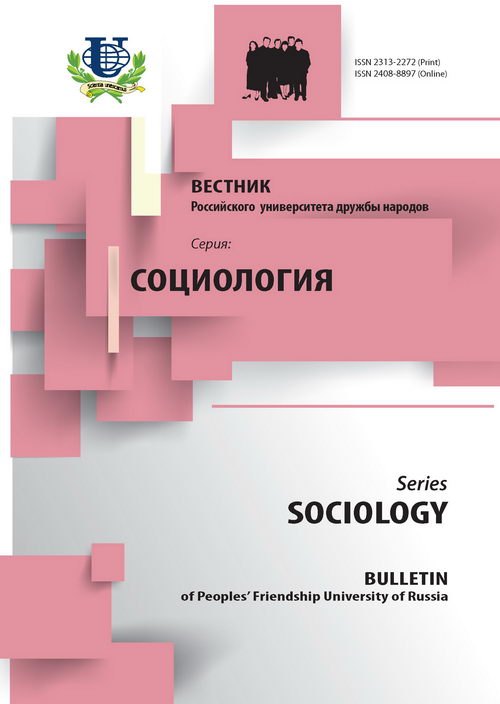Трансформация социальных практик: концепция П. Бергера и Т. Лукмана в условиях кризисного общества
- Авторы: Осипова Е.Д.1
-
Учреждения:
- Российский университет дружбы народов
- Выпуск: № 2 (2015)
- Страницы: 69-79
- Раздел: Статьи
- URL: https://journals.rudn.ru/sociology/article/view/6457
- ID: 6457
Цитировать
Полный текст
Аннотация
Представленная статья посвящена теории конструирования реальности Питера Бергера и Томаса Лукмана в контексте трансформации социальных практик общества риска. Согласно указанной концепции повседневность является основой социальной реальности, которая, в свою очередь, трактуется авторами как результат процесса взаимодействия людей. В статье подробно анализируются основополагающие механизмы конструирования социальной реальности, институционализации и легитимации, что позволяет, вслед за известными социологами, утверждать, что повседневность представляет собой базис социального мира. Однако, анализируя повседневные практики, можно сделать вывод об изменении привычных образцов поведения и формировании новых типов действия в ситуации нестабильного и непредсказуемого кризисного общества. Указанной проблеме в статье уделяется особое внимание. В современном мире привычная рациональная логика, которой человек традиционно руководствовался в обыденной жизни, организуя с помощью нее свое поведение, больше не выполняет возложенные функции. В результате развивается особый тип общественного сознания, получивший название катастрофического мышления. Основываясь на данных социологических исследований, в статье рассматривается в качестве наиболее ярких примеров трансформации социальных практик и развития нового типа рациональной логики изменение отношения к здоровью, а также возрождение интереса к составлению завещаний в современном мире.
Об авторах
Екатерина Дмитриевна Осипова
Российский университет дружбы народов
Автор, ответственный за переписку.
Email: osipova0512@rambler.ru
Кафедра социологии
Список литературы
- Бергер П., Лукман Т. Социальное конструирование реальности. Трактат по социологии знания. URL: http://skepdic.ru/wp-content/uploads/2012/11/0458680_BCA67_piter_berger_ lukman_t_socialnoe_konstruirovanie_realnosti_tr.pdf.
- Бронзино Л.Ю., Вольчина А.Е. Адаптация студентов к университетской среде: опыт социально-феноменологического исследования // Вестник РУДН. Серия «Социология». 2012. № 4.
- Бурдье П. Социология социального пространства. М.: Институт экспериментальной социологии; СПб.: Алетейя, 2005.
- Гидденс Э. Устроение общества: Очерки теории структурации. М.: Академический проект, 2003.
- Завещания: от экзотики - к норме? URL: http://fom.ru/posts/11347.
- Ковалевская А.Ф. Формирование ценностного отношения к здоровью человека // Проблемы современной экономики. 2007. № 1.
- Королев С.А. Повседневность как эманация социальности: трансформации и тренды. URL: http://e-notabene. ru/fr/article_709.html.
- Леухина Л.Е. Обыденность в условиях трансформации общественной жизни // Вестник Чувашского университета. 2011. № 2.
- Марков Б.В. Понятие повседневности в гносеологии и антропологии // Научная рациональность и структуры повседневности. СПб.: СПбГУ, 1999.
- Мещерякова Л.Ю. Феноменологическая социология Альфреда Шюца: теоретические предпосылки и основные идеи // Вестник РУДН. Серия «Социология». 2002. № 1.
- Найдыш О.В. «Жизненный мир» и обыденное сознание // Вестник РУДН. Серия «Философия». 2011. № 1.
- Островская-мл. Е.А. Концепции институционализации в германской теоретической социологии второй половины XX века // Вестник РУДН. Серия «Социология». 2003. № 1.
- Шюц А. Смысловая структура повседневного мира: очерки по феноменологической социологии. URL: http://socioline.ru/files/5/165/shchyutc_smyslovaya-struktura-povsedevnosti.pdf.
- Штомпка П. Социология социальных изменений. М.: Аспект Пресс, 1996.
- Штомпка П. Культурная травма в посткоммунистическом обществе // Социологические исследования. 2001. № 2. С. 3-12.
Дополнительные файлы













